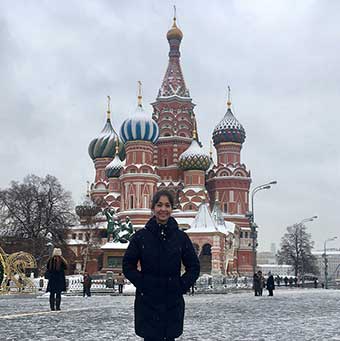Jennifer Ginsburg '14
Cultural Connections
Before attending Brandeis, Jennifer Ginsburg had never studied Russian. In fact, her only language experience had been with high school Spanish, but she was drawn to Brandeis University precisely because of its program in Russian language and culture, which seemed to complement her burgeoning interests in the Cold War and in the politics of the post-Soviet region.
 To say that studying language has influenced Jennifer's life would be an understatement. The Russian language and culture have served as a springboard for many of her accomplishments, including several prestigious internships as an undergraduate. She spent two summers working for the Science and Technology Center in Kyiv, Ukraine, and the U.S. State Department's Bureau of Arms Control, Verification and Compliance in Washington, D.C. After completing a major in Russian at Brandeis in 2014, Jennifer joined the Peace Corps and taught English in Kosovo for 2-1/2 years.
To say that studying language has influenced Jennifer's life would be an understatement. The Russian language and culture have served as a springboard for many of her accomplishments, including several prestigious internships as an undergraduate. She spent two summers working for the Science and Technology Center in Kyiv, Ukraine, and the U.S. State Department's Bureau of Arms Control, Verification and Compliance in Washington, D.C. After completing a major in Russian at Brandeis in 2014, Jennifer joined the Peace Corps and taught English in Kosovo for 2-1/2 years.
Although most of the Peace Corps volunteers in the Kosovo region worked in Albanian villages, Jennifer's knowledge of Russian landed her a position in a village where people spoke Serbian, a Slavic language related to Russian. Not only was this placement personally beneficial to Jennifer because she had the opportunity to learn Serbian, but it also helped her develop strong interpersonal communication skills and build solid cultural connections. Because of the political ties between Serbia and Russia, the Russian language was still taught in the village schools, and older inhabitants often spoke with her in Russian in addition to their native Serbian.
Jennifer says her language classes at Brandeis taught her much more than just the Russian language. They also helped her to understand the importance of cultural creations, such as folk songs and proverbs, elements that weave together the linguistic heritage and the social history of a people. In her work on nationalism and ethnic politics in the former Soviet Union and the former Yugoslavia for the master's program in Russian Studies at Columbia University, Jennifer has had the chance to further explore these interconnections.
For instance, in 2018, when she returned to the Balkans to conduct research on cinema in the former Yugoslavia, she found that discussing film enabled her to facilitate conversations with people who, given the history of the region, might have otherwise been suspicious of speaking to an American. Sharing an interest in these films led to talks about other topics, including contemporary politics. That experience in particular demonstrated for Jennifer the fundamental link between language and culture and its real-world applications.
According to Jennifer, the inherent value of language courses, despite the challenges they may pose, lies in the unique way in which they enable students to discover other cultures and other parts of the world. For example, while enrolled in a Russian language class, students simultaneously absorb Russian culture, history and politics, and this type of intensive learning experience can inspire them to explore related topics, expand their awareness of others and seek out new connections with the world.
This interview was conducted in 2018-19 by Diana Filar, PhD'21.